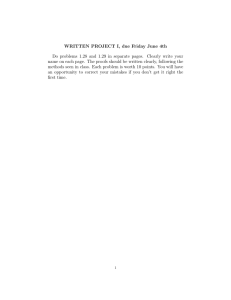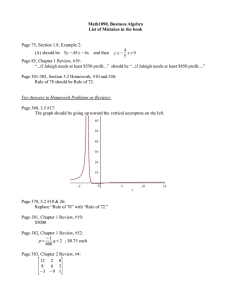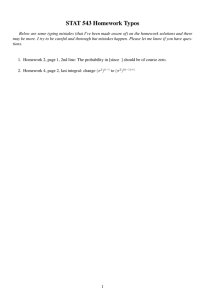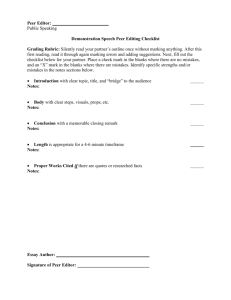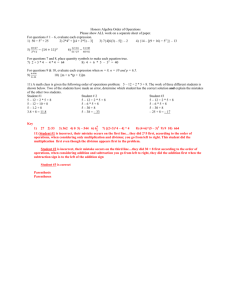Grading and remarks f Lab 1
advertisement
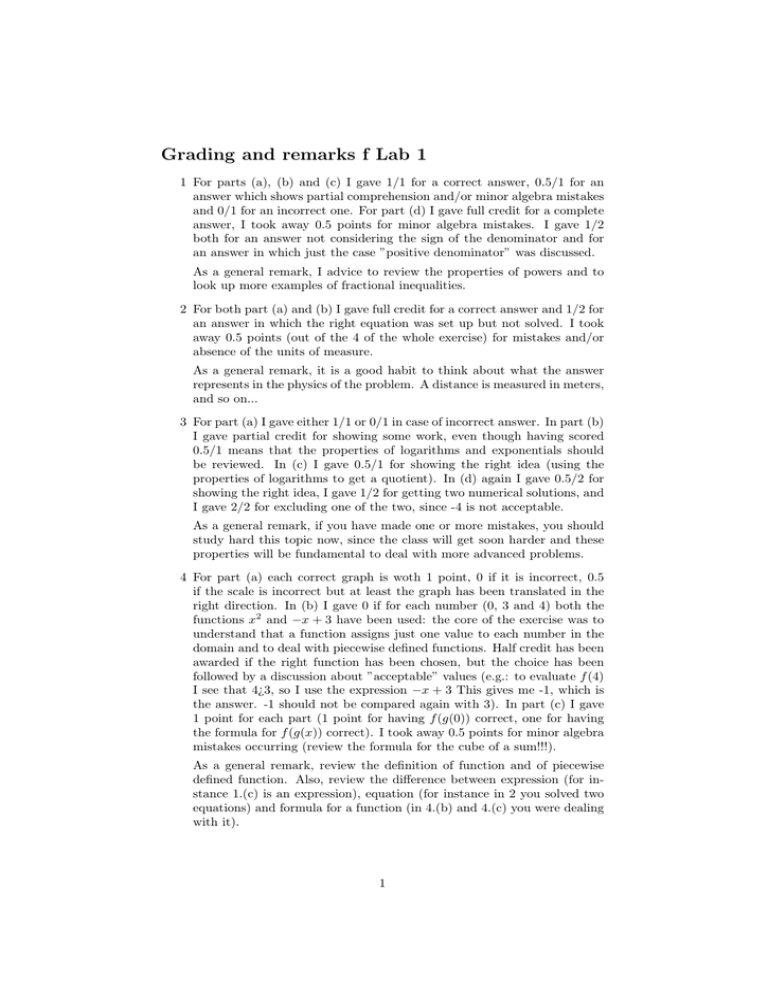
Grading and remarks f Lab 1 1 For parts (a), (b) and (c) I gave 1/1 for a correct answer, 0.5/1 for an answer which shows partial comprehension and/or minor algebra mistakes and 0/1 for an incorrect one. For part (d) I gave full credit for a complete answer, I took away 0.5 points for minor algebra mistakes. I gave 1/2 both for an answer not considering the sign of the denominator and for an answer in which just the case ”positive denominator” was discussed. As a general remark, I advice to review the properties of powers and to look up more examples of fractional inequalities. 2 For both part (a) and (b) I gave full credit for a correct answer and 1/2 for an answer in which the right equation was set up but not solved. I took away 0.5 points (out of the 4 of the whole exercise) for mistakes and/or absence of the units of measure. As a general remark, it is a good habit to think about what the answer represents in the physics of the problem. A distance is measured in meters, and so on... 3 For part (a) I gave either 1/1 or 0/1 in case of incorrect answer. In part (b) I gave partial credit for showing some work, even though having scored 0.5/1 means that the properties of logarithms and exponentials should be reviewed. In (c) I gave 0.5/1 for showing the right idea (using the properties of logarithms to get a quotient). In (d) again I gave 0.5/2 for showing the right idea, I gave 1/2 for getting two numerical solutions, and I gave 2/2 for excluding one of the two, since -4 is not acceptable. As a general remark, if you have made one or more mistakes, you should study hard this topic now, since the class will get soon harder and these properties will be fundamental to deal with more advanced problems. 4 For part (a) each correct graph is woth 1 point, 0 if it is incorrect, 0.5 if the scale is incorrect but at least the graph has been translated in the right direction. In (b) I gave 0 if for each number (0, 3 and 4) both the functions x2 and −x + 3 have been used: the core of the exercise was to understand that a function assigns just one value to each number in the domain and to deal with piecewise defined functions. Half credit has been awarded if the right function has been chosen, but the choice has been followed by a discussion about ”acceptable” values (e.g.: to evaluate f (4) I see that 4¿3, so I use the expression −x + 3 This gives me -1, which is the answer. -1 should not be compared again with 3). In part (c) I gave 1 point for each part (1 point for having f (g(0)) correct, one for having the formula for f (g(x)) correct). I took away 0.5 points for minor algebra mistakes occurring (review the formula for the cube of a sum!!!). As a general remark, review the definition of function and of piecewise defined function. Also, review the difference between expression (for instance 1.(c) is an expression), equation (for instance in 2 you solved two equations) and formula for a function (in 4.(b) and 4.(c) you were dealing with it). 1 5 In part (a) I gave 0.5 points for each correct answer. In part (b) I took away 0.25 points for missing parts (such as not evaluating the tangent) and for mistakes occurring more than once (review the definition of tangent! And remember that 1/0 is not defined! It is not 1!!!). In part (c) I gave full credit for a complete work showing the four solutions. I gave 1 point for guessing the two guessable ones (0 and 2π). Note, 0 and 2π could have been guessed, so I gave partial credit. To people just writing all the 4 correct solutions without any explanation I gave no credit (there is no way to guess the other two solutions, so if you wrote them down without any explanation I considered it copying). 2
